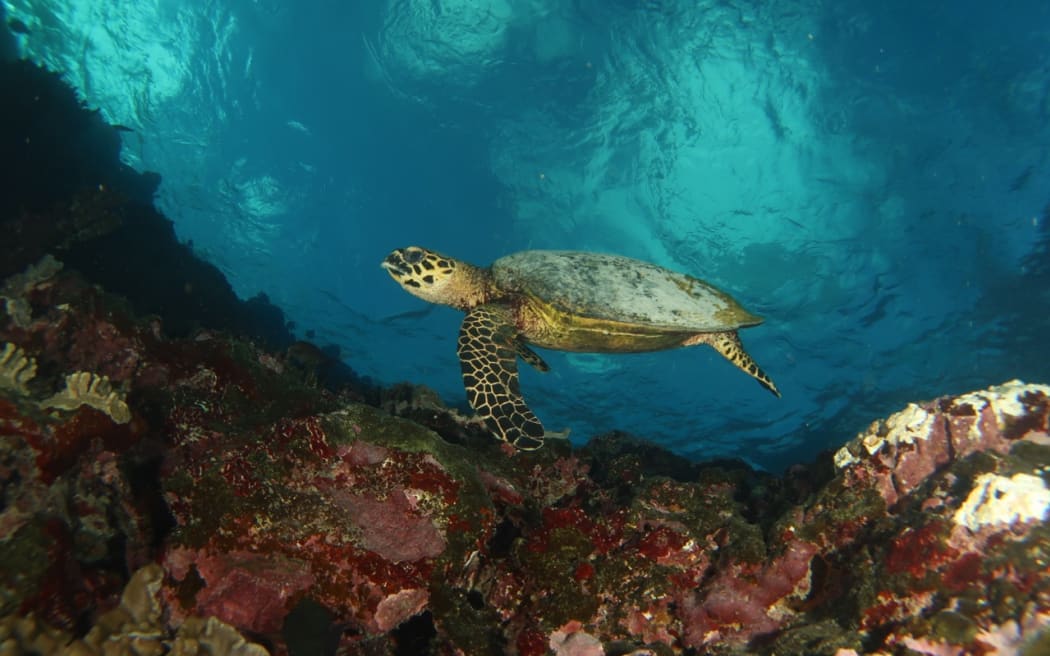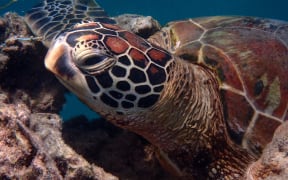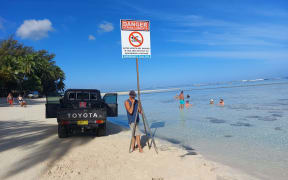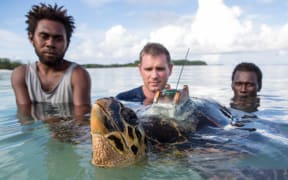
Turtles have unique facial patterns that can be used to identify them, like a human's fingerprints. Photo: Supplied / Te Ipukarea Society
The majority of turtle tour operators in the Cook Islands have agreed to new safety and environmental standards.
The safety standards are part of a memorandum of understanding (MOU) with Cook Islands Tourism which requires tour operators to have one guide for every four guests in the water.
The agreement also includes a provision to only run commercial tours on weekdays and need to seek approval from local landowners to run non-commercial tours on weekends.
The MOU comes after the death of a 50-year-old New Zealand man in Avaavaroa Passage in December last year where the tours take place.
Environmental regulations include not installing structures on the reef, maintaining a 3-metre distance from turtles and rays when possible, and not using flash photography.
Cook Islands Tourism director of destination development Brad Kriner said the agreement is designed to keep guides and customers safe.
"It can be dangerous, there are strong currents active through [the Avaavaroa Passage] so it needs to be well managed," Kriner said.
He said the MOU was originally set up about 12 months ago and modifications have since been made to the agreement taking into consideration views from stakeholders like land owners.

Hawksbill turtles, found in Cook Island waters, are critically endangered. Photo: Supplied / Adventure Cook Islands
Nine tour operators have signed up to the agreement.
Kriner said Cook Islands Tourism is primarily a marketing organisation, so the agreement is not legally binding.
"The resulting MOU, it's essentially a code of conduct that gives the signees the ability to hold themselves and their competitors accountable to certain conservation and safety standards."
Kriner said the National Environment Service had been given permission to update the Environmental Management Act, which would include rules around turtle tour operations.
Snorkel Cook Islands is one of the operators who had not signed the MOU.
Business owner Joshua Utanga said his business was established in 2018 on the back of a 10-year professional lifeguarding career and local knowledge from a competent waterman.
Utanga claimed there were more than 15 operators and they have no internationally recognised qualifications or experience.
"Prior to the influx of these operators there were no drownings or disruption to marine life," he said in a statement.
"Since [the MOU] being formed we have had a human drowning and also a death of a turtle.
"Prior to there being so many under qualified operators and competition for beach access, we had 'out of work hours' preventive safety measures in place. Last year we lost our beach front access due to industry competition, preventing us to continue our out of hours preventive safety procedures.
"The human drowning in our workplace is not a coincidence, it was just a matter of time."
Utanga said there had also been an increase in the use of motorised boats by operators claiming to be used as safety vessels but were actually used to allow "high risk customers" like young children and novice swimmers to go on a tour.
"In the recent drowning none of these boats were available to be used for the rescue," he said.
"The consequences of boat use within the lagoon has already resulted in a turtle dying last September here in Rarotonga. The use of boat taxis within close proximity to snorkelers in the water is an accident waiting to happen."
Utanga also wanted Avaavaroa passage to be turned into a marine reserve.
Kriner said Utanga had chosen to criticise from afar instead of being part of the discussion.
"I agree that there are more operators than what we'd ideally like in the passage, but there's no way of restricting those numbers yet," he said.
Kriner said Snorkel Cook Islands are unable to commit to the standards of the MOU because his business model allows customers to self-guide.
"They basically take themselves around the area, Snorkel Cook Islands are the only operators that allow that.
"We've had reports with up to 40 people at a time doing that experience.
"[It's] actually the major cause of overcrowding in the passage, it doesn't fit within the four to one closely supervised standard that the other operators have committed to."
Kriner said the business had also placed a lifeguard tower on the reef which had caused concern from the National Environment Service and the Ministry of Marine Resources.




